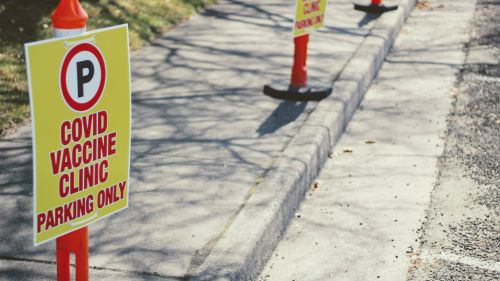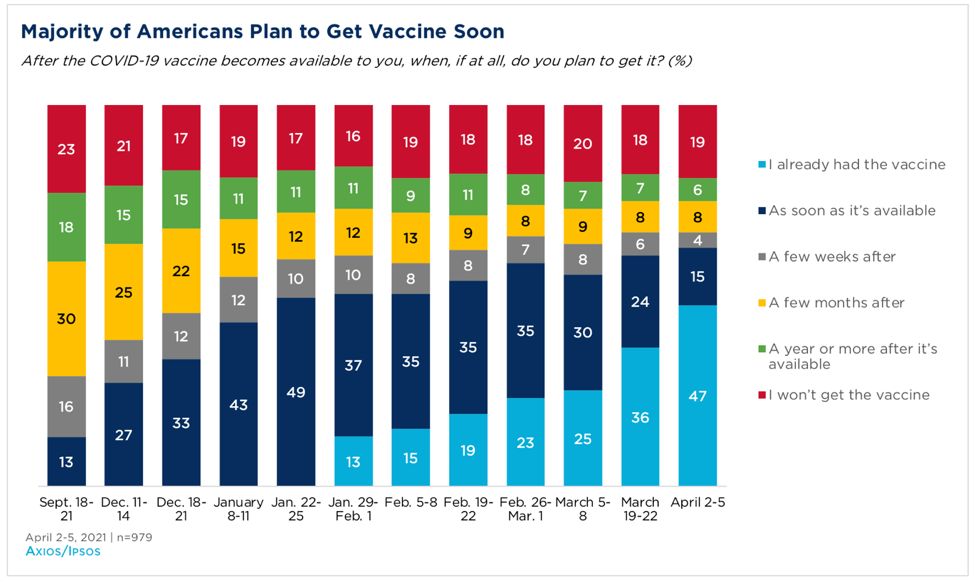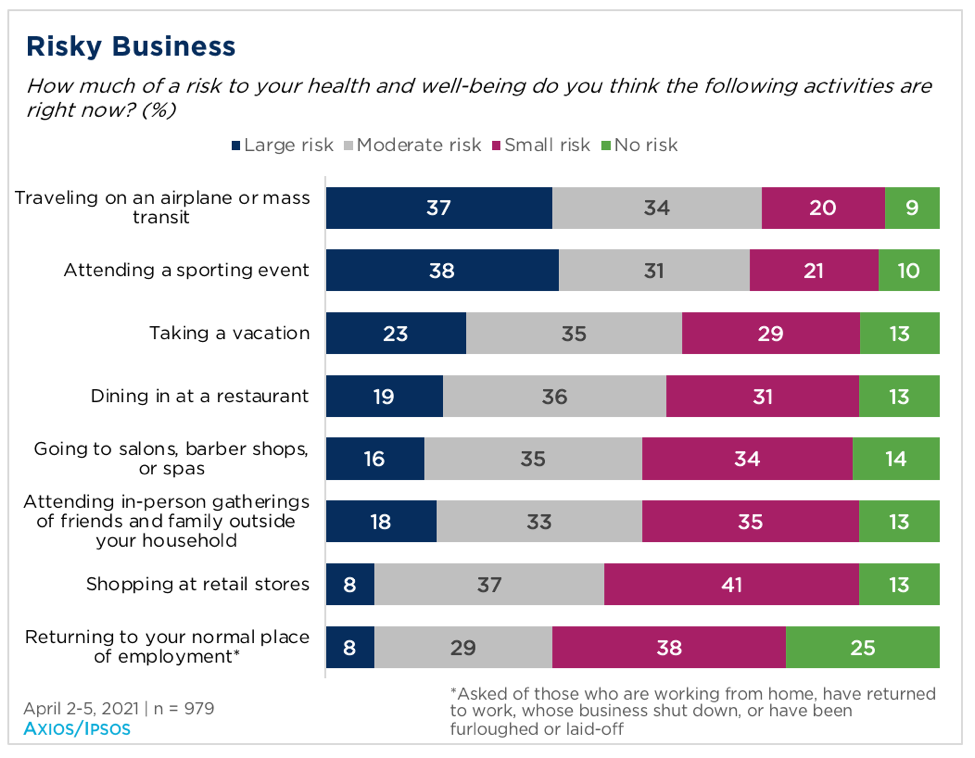As Rollouts Vary and Issues Arise, Global Public Opinion Shows Vaccine Anxiety

With high-profile suspensions of the AstraZeneca and Johnson and Johnson vaccine, fear of potential side effects and uneven efficacy of vaccine rollouts are causing concern for some.
This week the world passed the 137.5 million case mark, with over 2.9 million deaths attributed to COVID-19. Vaccine concerns, varied success of rollouts, and growing case counts in some nations demonstrate that while people may be able to see the light at the end of the tunnel, the pandemic is not over.
For this week’s COVID-19 update, the Chicago Council Survey team looks at polling results from the United States, Japan, France, the United Kingdom, and India.
Key Findings
- In the United States, 63 percent of Americans say they have either gotten at least one dose of vaccine already (47%) or plan to get vaccinated as soon as it’s available (15%).
- Seven in ten (70%) Japanese say another state of emergency should be declared in areas where COVID-19 cases are growing.
- In France, the country enters a third national lockdown and citizens express pessimism towards the French economy. A majority (77%) say they feel rather not confident in the future of the economy.
- A majority of British respondents (59%) say they would be willing to carry a vaccine passport in all circumstances, while a further quarter (26%) say they would be willing to carry a vaccine passport for international travel only.
The United States
31.3 million cases, 562,994 deaths
The US vaccine rollout hit a snag on April 13 when the FDA paused use of the Johnson & Johnson vaccine, investigating six reports of blood clotting incidents among the 7.2 million Americans who have received the J&J one-shot vaccine. But the vaccination campaign continues, driven by strong demand among the public. Over 120 million Americans have gotten at least one dose of vaccine, and 75 million Americans are now fully vaccinated against COVID-19.
However, the supply of vaccine may soon exceed immediate demand—a problem most nations around the world would be only too happy to have. As eligibility for vaccination has increased, those Americans who planned to get one as soon as it became available have done just that.
The latest coronavirus tracking poll from Axios/Ipsos finds that 63 percent of adults say they have either gotten at least one dose of vaccine already (47%) or plan to get vaccinated as soon as it’s available (15%). However, the proportion of Americans who say they will not get vaccinated, or who will get it in a year or a few months after it becomes available, has been largely stable over the past month.

Americans are also growing less concerned about reengaging in normal behaviors. Only half of Americans (51%) say that attending in-person gatherings of friends and family is a large or moderate risk to their health, down from 75 percent in January. The public is also less concerned about dining out: just over half (55%) see it as a large or moderate risk to their health, down from 69 percent in January. And most Americans (63%) say that returning to their normal workplace is either a small risk to their health (38%) or no risk at all (25%).

However, this reduced sense of risk from normal behaviors may be prolonging the pandemic. While the US vaccine rollout is farther along than most countries—and nearly eighty percent of Americans over the age of 65 have gotten at least one vaccine dose—the pandemic is far from over, and some states (particularly Michigan) are seeing cases rise rapidly, driven by curtailed restrictions and new, more transmissible variants.
Japan
512,169 cases, 9,469 deaths
Now 100 days out from the opening of the Tokyo Olympic and Paralympic Games, Japan is in a hard-fought battle to limit the spread of the coronavirus. Osaka, in particular, is struggling with a new wave of cases, reporting over 1,000 new cases each of the past two days.
NHK polling conducted April 9-11 finds approval of the government’s response to the pandemic in the red, with 53 percent expressing disapproval (44% approve). One reason for continued disapproval: the government’s response so far—a new set of ‘priority measures’ aimed at preventing the spread of COVID-19—aren’t widely seen as effective. In NHK polling, a majority see these measures as either not very (48%) or not at all effective (10%), though a third (34%) say they are at least somewhat effective. And the public is quite concerned about a further wave of infections, with a plurality (46%) saying they are very concerned, and a further 38 percent somewhat concerned.
One measure the public backs to fight the pandemic: the imposition of another state of emergency. Seven in ten (70%) say another state of emergency should be declared in areas where COVID-19 cases are growing.
Pandemic concerns are also likely to hamper the traditionally jam-packed travel period of Golden Week, when the concurrence of four public holidays (Showa Day, Constitution Memorial Day, Greenery Day, and Children’s Day) makes for the longest nationwide vacation period of the year. However, most Japanese (78%) say they aren’t planning to travel during the holiday this year, and only 3 percent have made travel plans at this point.
Additionally, while few countries would envy the death toll the United States has suffered during the pandemic, the scope and speed of the American vaccine rollout is inducing some vaccine envy among the Japanese public. Yomiuri Shimbun polling conducted April 2-4 finds that seven in ten Japanese say they are either very (32%) or somewhat (38%) dissatisfied with the delay in Japan’s vaccine rollout, compared to other countries like the US. And the demand is there among the Japanese public: in TBS/JNN polling conducted April 3-4, seven in ten Japanese (71%) say they want to get vaccinated, up five points since March.
France
5.1 million cases, 99,480 deaths
After much effort to avoid this outcome, France entered its third national lockdown—or confinement—on March 31. President Emmanuel Macron announced the closure of schools for three weeks, the extension of lockdown rules to the entirety of the French territory, the reinforcement of intensive care units, and the availability of vaccines to those over 60 starting in mid-April. This decision came as COVID-19 cases began to approach levels not seen in France since the peak of the second wave in November. More recently on April 13, Prime Minister Jean Castex announced that flights to Brazil would be halted over fears of the Brazil variant. While Macron said that the reopening process would begin in mid-April, it’s unclear whether France will be ready to do so at that time.
One potential issue for France is the growing concern over the AstraZeneca vaccine’s observed blood clotting issue. An April 7-8 Odoxa survey found that while 70 percent of French people are either already vaccinated (19%), will certainly get vaccinated (30%), or will probably get vaccinated (21%), 71 percent of French people say they do not have confidence in the AstraZeneca vaccine. They do, however, have confidence in the Pzifer (70%), Moderna (65%), and Johnson & Johnson (59%).
However, even with the confidence in these other vaccines, most people say that the government’s actions with respect to the vaccine rollout has not inspired confidence (63%), has not been coherent (68%), and has not been clear (70%). And, in regard to Macron’s comment that every French adult who wants a vaccine can get one by the end of the Summer, just 36 percent believe this promise will be held.
And as the third lockdown begins and the end of the pandemic appears to grow further away, a March 31-April 1 Odoxa survey shows a continuing pessimism toward the French economy. Asked about their confidence in the future of the French economy over the last few weeks, 77 percent say they feel rather not confident while just two in 10 (23%) say they do feel confident. Additionally, 88 percent of French people say they think the confinements over the last year have led to an acceleration in the rise of prices. And, 91 percent say that over the last 20 years, the price of a baguette has risen more than the minimum wage. Despite these concerns about price level and the economy, asked about which things were most important to them, the largest proportion chose health (62%) while the second largest proportion, at slightly more than half of that amount (36%), chose purchasing power.
The United Kingdom
4.3 million cases, 127,123 deaths
After living under some of the most strenuous levels of government restrictions for the longest period of time in the world, Britain began a cautious reopening on Monday. Non-essential shops, gyms, and hairdressers were allowed to re-open in England, along with outdoor spaces at pubs and restaurants. Since the beginning the year, the United Kingdom has seen a steady decline in the average number of daily cases; however, with infections rising in Europe and the easing of restrictions across the country, some experts worry about a potential third wave in the summer months.
A March 17 survey of British adults by Redfield and Wilton shows mixed feelings about the future trajectory of the pandemic. A majority (60%) of Britons believe the worst of the coronavirus pandemic is behind them, compared to a minority (19%) who say the worst is yet to come. But, a minority of British respondents (34%) think the worst of the economic effects is behind them, compared to a plurality (45%) who say the worst of the economic effects is yet to come.
Meanwhile, the United Kingdom’s vaccination program is in full swing and expected to be effectively completed this summer, several weeks ahead of the EU’s effort. According to Airfinity, which tracks vaccination programs around the world, a large majority (75%) of Britons will be fully immunized by the first week of August. As more people get vaccinated, policy makers and citizens alike are discussing the probability of “vaccine passports” as requirements for certain activities. According to an April 2 poll by Redfield and Wilton, a majority of British respondents (61%) say they would “support” or “strongly support” the use of vaccine passports by businesses such as pubs. Additionally, a majority of respondents (59%) say they would be willing to carry a vaccine passport in all circumstances, while a further quarter (26%) say they would be willing to carry a vaccine passport for international travel only.
India
13.8 million cases, 172,085 deaths
In India, the country is experiencing its worst surge of the pandemic and recently surpassed Brazil as the country with the second-most reported infections. The country recorded more than 168,000 new cases over a 24-hour period on Monday, almost double the number of daily cases experienced during India’s first severe wave in the fall of 2020. A majority (83%) of new infections occurred in ten of India’s 29 states, with the western state of Maharashtra being the hardest hit.
Health officials in India attribute the increase in cases to people’s lack of commitment to wearing masks and practicing social distancing. Additionally, recently held election rallies and a string of large religious gatherings are being correlated to the surge. Although several states have reintroduced evening or weekend lockdowns in response to the increases, officials are concerned about the economic effects of more severe actions. Because roughly 90 percent of India’s workforce is informal and reliant on day-to-day work to earn a living, shutdowns have drastic effects on the Indian economy.
In terms of vaccination efforts, India has become the “fastest country in the world” to administer more than 100 million doses of coronavirus vaccines, doing so within 85 days. With the vaccine eligible to everyone above the age of 45 as of April 1, the country hopes to cover 250 million people by July. Many question the feasibility of achieving this goal; however, some experts believe that India is well prepared for this challenge given that the country has been running one of the world’s largest immunization programs for decades.





